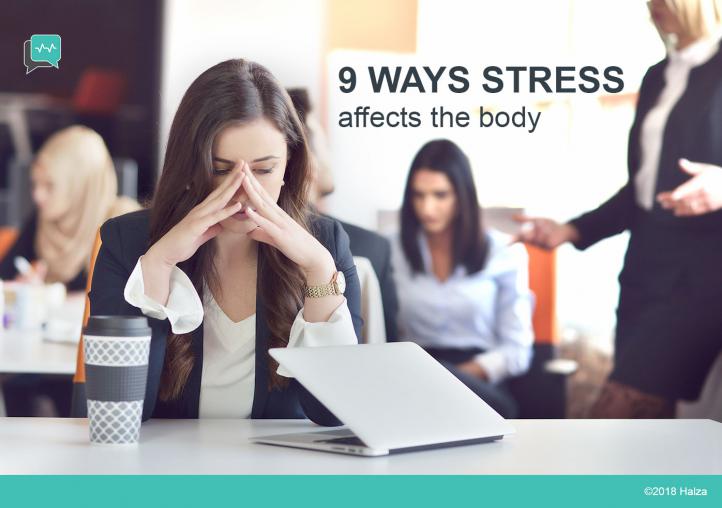9 Ways Stress Affects The Body

Stress is something we’ve all experienced at various points in our lives. While no one enjoys feeling jittery or nervous, stress in small doses (also known as acute stress) can make us more alert and push us to deal with events better – such as completing a big project, learning something new out of your comfort zone, or navigating your way out of a dangerous situation. On the other hand, feeling stressed for long periods of time from weeks to months can take a toll on the body. This is known as chronic stress, and can come about from many situations including work woes, relationship problems, or financial difficulties.
These are some of the harmful effects of chronic stress on one’s health:
1. Weight gain from overeating and excessive snacking
Emotional eating, or stress eating, happens when you’re trying to distract yourself  from negative emotions, rather than to satisfy physical hunger. You might also get increased cravings for fatty and sugary food – i.e. comfort food – such as chocolate and crisps when under stress.
from negative emotions, rather than to satisfy physical hunger. You might also get increased cravings for fatty and sugary food – i.e. comfort food – such as chocolate and crisps when under stress.
While stress eating might make you feel better in the moment, it does nothing to address the underlying problem. Over a period of time, stress eating can cause weight gain and possibly lead to obesity-related illnesses such as Diabetes and Heart Disease.
2. Dental damage due to grinding of teeth
 A person can start habitually clenching their jaw and grinding their teeth as a response to stress. Similar to how one might yell or make noises of frustration to ease tension, this display of aggression is a coping mechanism. Grinding of the teeth, also known as Bruxism, usually happens subconsciously or when one is asleep.
A person can start habitually clenching their jaw and grinding their teeth as a response to stress. Similar to how one might yell or make noises of frustration to ease tension, this display of aggression is a coping mechanism. Grinding of the teeth, also known as Bruxism, usually happens subconsciously or when one is asleep.
This could eventually lead to damage to the teeth and jaw pain. A mouth guard might have to be worn to prevent further injury.
3. Difficulty controlling emotions, panic attacks, and possible onset of mental illness
Stress is a negative emotion and naturally, you’re going to feel down in the dumps during trying times. But other than simpl y feeling upset, you might find yourself experiencing intense feelings of anger or lashing out at others for the tiniest of reasons.
y feeling upset, you might find yourself experiencing intense feelings of anger or lashing out at others for the tiniest of reasons.
Chronic stress can lead to, or worsen, psychological problems and mental illnesses such as depression, bipolar disorder, and anxiety. You might also experience panic attacks, which not only come with mental distress, but also physical symptoms which include breathing difficulties, nausea, acid reflux, dizziness, and an irregular heartbeat.
Inhale and exhale deeply and slowly with your eyes closed when in a state of panic to help regulate your breath and heartbeat. If you find yourself experiencing extreme moods often and being unable to cope, do not be afraid to seek help from a counselor or psychiatrist.
4. Irregular menstrual cycle
Stress can affect the body’s ability to produce hormones. Hence, it could affect a female’s menstrual cycle, where she may experience irregular periods or even have her period stop altogether for a temporary duration.
Other than possibly affecting one’s family planning, an irregular period cycle due to stress can cause menstrual cramps to be more painful due to the uterus lining being thickened for a prolonged period of time.
5. Insomnia
You might find your mind repeatedly drifting back to the subject that’s causing you chronic stress, even at times when you’re not physically in the situation. This, coupled with the constant emotional strain, can hinder your good night’s rest. Stress has been linked to insomnia, which makes it difficult for one to fall asleep and stay asleep peacefully throughout the night.
Try winding down an hour before heading to bed with relaxing activities such as reading a book or listening to calming music. As far as possible, do not do anything work-related during that period even if it’s tempting to clear those notifications off your phone.
6. Skin problems, hair fall, and premature aging
Stress brings about an increased production of oil, which can lead to acne outbreaks even in adulthood.
Stress can also damage existing cells and affect the growth of new cells in the body, making one age prematurely with wrinkles, dull skin, deteriorating eyesight, and weakened muscles. You might also experience hair loss and greying hair due to weakened hair cells.
7. Increased blood pressure
When you’re stressed, your heart rate quickens and blood vessels contract. A while after the stress aggressor disappears, your heart activity should return to normal. However, prolonged stress can lead to constant high blood pressure, and this, in turn, can increase your risk of strokes and heart attacks.
8. Greater tendency to fall ill
You’ll likely have a weakened immune system under stress, so you might find yourself catching colds more often. Remember to eat healthily and boost your immune system with foods rich in Vitamin C if you’re going through a particularly stressful period.
Chronic stress has also been linked to other more serious illnesses such as cancer, lung disease, and heart problems, due to the high amount of pressure your body is under.
9. Headaches and body aches
Everyday stress causes your muscles to contract and stiffen, and this tension can cause headaches or even pulsating migraines. Sometimes, you will even feel this tension extending to your shoulders, neck, back, or rest of your body – whether you’ve been working your muscles or not.
These aches are a defense response and sign from your body telling you to slow down and get some rest. Apply some topical pain relief cream to your aching muscles, and get enough shut-eye so that your body can repair itself properly.
Dealing with stress in a healthy way
It’s inevitable that you will run into stressful affairs throughout the course of your life. But letting your health suffer because of it is something that can be prevented. Remember this simple phrase: mind over body. When your mind thinks positively, your body tends to react better to situations. Likewise, if you keep telling yourself that you can’t handle something, your body will go into defense mode and you’re more likely to fall sick.
When stressed, don’t turn to quick fixes like alcohol and smoking – once the temporary high wears off, you’ll feel worse and even get withdrawals. This won’t address the root of the problem and you’ll only get unhealthier in the long run.
Instead, turn to wholesome distractions such as exercise, painting, reading a book, or playing an instrument. Take little breathers to recharge amidst the hustle. Always try to find the positives in little things, and remind yourself that you’re strong enough to tackle anything your mind tells you to.
If you think you know everything about stress, test your knowledge now:
Learn more about stress in our other articles:




